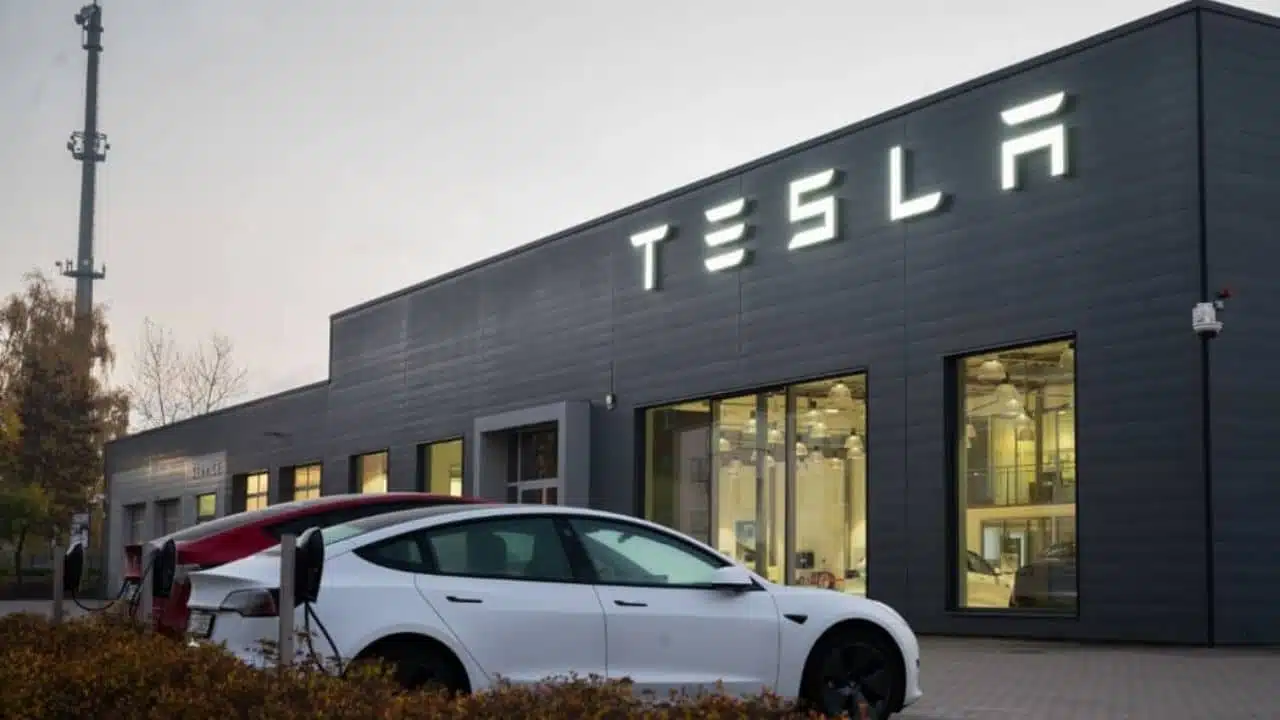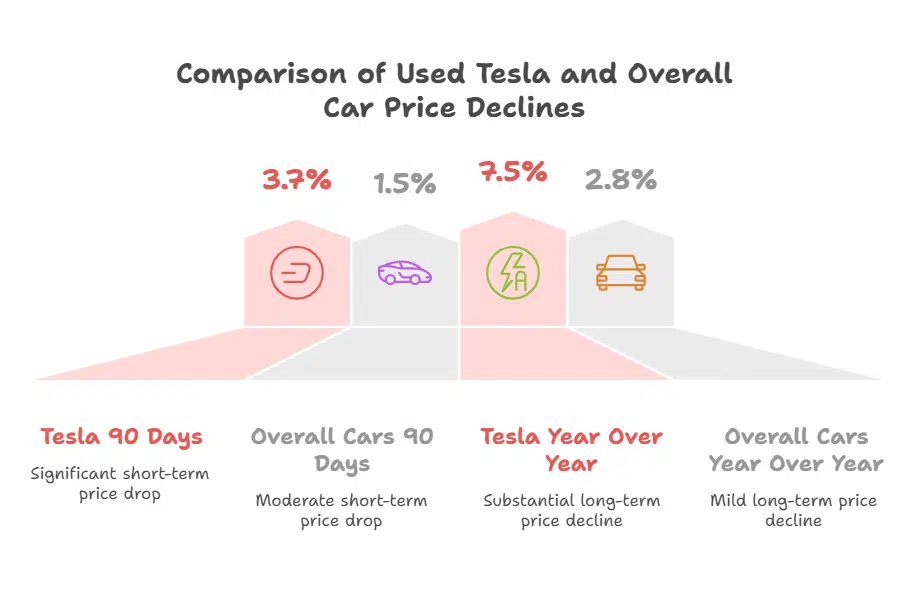Tesla, once the undisputed leader in the electric vehicle (EV) industry, is facing a severe image problem that is impacting its business on multiple fronts. The automaker, which was once revered as the go-to brand for environmentally conscious consumers, has seen declining sales, plummeting used car values, and growing backlash against its CEO, Elon Musk. The brand that was once celebrated for its innovation and sustainability now finds itself in the middle of political controversies, market shifts, and consumer sentiment declines.
Declining Sales and Market Share Loss
Tesla’s Struggles in Key Markets
Tesla’s dominance in the EV market is being challenged as new car sales have sharply declined in several key regions, particularly in Europe and China. In the European market, Tesla has seen a significant drop in demand. The situation worsened after Musk’s controversial public endorsements of far-right political figures, which have alienated a considerable portion of Tesla’s environmentally conscious customer base. Sales in Germany, for example, fell by a staggering 76% in February 2025 compared to the previous year. The decline coincides with Musk’s support of the far-right Alternative für Deutschland (AfD) party, sparking outrage and boycotts from European consumers.
In China, the problem is less about Musk’s political involvement and more about growing competition. Chinese EV manufacturers like BYD, Nio, and XPeng have aggressively expanded their market presence, offering high-quality EVs at competitive prices. This has significantly cut into Tesla’s market share, with many consumers opting for local brands that provide better features at lower costs. Moreover, Tesla has been forced to slash prices multiple times in China in an attempt to remain competitive, but the move has only hurt its profit margins while failing to stop the bleeding in sales.
The situation in the U.S. is somewhat different but still problematic. While Tesla remains a dominant player, new car sales have started to dip. February 2025 saw a nearly 6% decline in Tesla’s U.S. sales, with the Model 3 and Cybertruck facing particularly weak demand. The reasons for this decline include increased competition, price cuts that eroded resale values, and a growing number of consumers distancing themselves from the brand due to Musk’s political views and controversial statements.
Elon Musk’s Political Controversies and Their Impact on Tesla’s Image
A CEO’s Influence on a Brand
Elon Musk has long been known for his outspoken personality and unfiltered statements on social media. However, in recent years, his political leanings and endorsements have increasingly become a point of contention, turning some Tesla enthusiasts into critics. Once viewed as a visionary entrepreneur dedicated to solving climate change, Musk now finds himself associated with right-wing political figures and causes that many of Tesla’s traditional customers find troubling.
His support for former U.S. President Donald Trump, his promotion of conspiracy theories, and his recent endorsement of European far-right parties have alienated progressive consumers who once saw Tesla as a symbol of innovation and sustainability. This shift in Musk’s public persona has led to a growing movement of Tesla owners selling their vehicles in protest. The controversy has also sparked vandalism and protests against Tesla locations, further harming the brand’s public image.
A growing number of Tesla owners have expressed frustration and embarrassment about being associated with the brand. Some have reported being called names or facing hostility simply for driving a Tesla. A YouTuber known as “Vegas Tesla Family” recently posted a video explaining that he was selling his Tesla “because of Elon Musk.” This sentiment is not isolated—many Tesla customers have voiced similar concerns, with some stating they no longer want to be linked to a brand associated with Musk’s divisive politics.
The Rapid Depreciation of Used Tesla Vehicles
Used Tesla Prices Falling at an Alarming Rate
Tesla vehicles were once seen as a wise investment, with some owners believing that their cars would hold their value better than traditional gasoline-powered vehicles. However, recent data shows that used Tesla prices are plummeting at a much faster rate than the broader car market. According to CarGurus, used Tesla prices have fallen by an average of 3.7% in the past 90 days, compared to a 1.5% decline for the overall used car market. Year over year, Tesla’s used car values have dropped by 7.5%, compared to just 2.8% for the market as a whole.
Factors Contributing to Tesla’s Depreciation
There are several reasons why Tesla’s used car values are dropping so quickly:
- Frequent Price Cuts on New Models: Tesla has repeatedly slashed prices on its new vehicles in an attempt to boost sales. While this strategy has made new Teslas more affordable, it has significantly hurt resale values. Consumers who bought Teslas at higher prices now find their vehicles worth significantly less than expected.
- Fleet Sell-Offs: Rental car companies and fleet owners who previously invested in Tesla vehicles are now offloading them in large numbers. Hertz, for instance, announced plans to sell thousands of Teslas from its fleet due to high maintenance costs and declining resale values.
- Increased Competition: With more automakers entering the EV market, Tesla no longer has a monopoly. Legacy automakers like Ford, GM, and Volkswagen are producing competitive electric vehicles, further reducing demand for used Teslas.
- Consumer Hesitation Due to Musk’s Politics: A growing number of consumers are hesitant to buy Teslas because they do not want to be associated with Musk. This has further weakened demand for used Teslas, accelerating their depreciation.
Tesla’s Response and Future Outlook
Tesla’s Efforts to Rebuild Its Image
Recognizing the growing challenges, Tesla is taking steps to improve its market position. The company is planning to launch new models, including a more affordable version of the Model Y in China, which is expected to be 20% cheaper to produce than the current model. Additionally, Tesla is working on a self-driving robotaxi service, which Musk claims will revolutionize urban transportation.
Despite these efforts, analysts remain skeptical. Many believe that Tesla’s problems run deeper than just market competition. If Musk continues to inject his political views into the public sphere, Tesla’s image crisis could worsen, further driving away potential customers. The company may also face difficulties attracting investors if it cannot stabilize its vehicle sales and resale values.
Can Tesla Recover?
Tesla still has a strong technological edge and a dedicated fan base. However, to regain its former prestige, the company will need to address both its internal and external challenges. This means focusing on product quality, maintaining competitive pricing strategies, and, perhaps most importantly, managing Musk’s public image to prevent further alienation of customers.
The next few years will be critical for Tesla’s future. Will the company find a way to recover, or will it continue to lose ground to competitors? Only time will tell, but one thing is clear: Tesla’s golden era as the undisputed leader in the EV space is under serious threat.




































